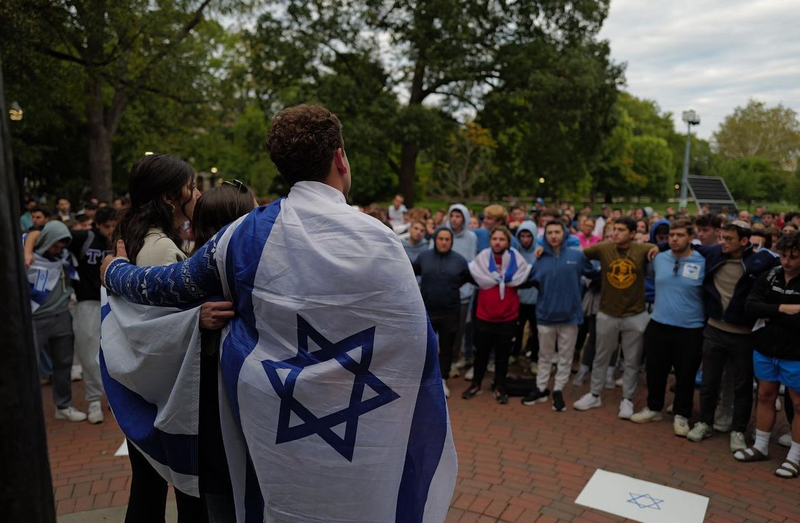Finding New Meaning in “Am Yisrael” Six Months After Oct. 7

Am Yisrael Chai – a song I sang, danced, and clapped along to at my Jewish preschool but never took the time to consider the deeper meaning of. Yet here I am, six months after October 7, no longer taking for granted the power of those words. The nation of Israel lives. In a period of rampant antisemitism across the globe, the nation of Israel lives, just as we always have.
As I reflect on the past six months, I can’t help but think about this idea of Am and what it truly means to be a nation. I think about how I felt lying in bed glued to my phone at 1 a.m. as the first videos of Hamas terrorists on white pickup trucks in the streets of Israeli neighborhoods began to surface. I remember the fear, heartbreak, shock, and disbelief. I felt that my own family was under attack. It’s a strange experience to be physically in one place with your heart thousands of miles away, but it made sense to me; Israel is home.
I also remember the shock and betrayal of realizing that classmates who I’d worked on group projects with were justifying and celebrating the attack. In the week following October 7, a friend of mine overheard a conversation in the dining hall about the war, which quickly devolved into the student saying he “hates Jews.” Though I have never been ashamed of my Zionist identity, I started thinking twice before mentioning Israel in conversation and checking my shoulder when I did. More than ever, I needed to find or build spaces where that wasn’t the case.
When I arrived in Israel in mid-December to see my family and volunteer, despite everything going on in the war, I found that space where I felt safe to be my full Jewish, Zionist self the same way I had during visits before the war. As antisemitism surged to unprecedented levels in the United States, in Israel, the people around me inherently understood me before I even spoke a word. But I’ve come to realize that in the past six months, I have felt this sense of community and belonging many times.
Just six days after the attack, a group of 20 student leaders from Hillel International’s Israel Leadership Network convened for a Shabbaton in Denver to begin planning the 2024 Israel Summit. Though the gathering had been scheduled months before, there was much uncertainty as to how a post-October 7, pro-Israel student leadership conference would look. With each other’s support, we got to work planning and strategizing what could be done on the campus and national levels. But that moment was about more than preparing for the summit. After six days of chaos on our respective campuses, we were finally able to step away and build a space to start processing and mourning together. Our bland, beige hotel conference room had quickly become a refuge.
The feeling was similar in Washington, D.C. as I joined the 290,000-person crowd for the March for Israel in November, and I’ve found myself catching glimpses of it on campus at Georgia Tech with my Jewish friends at Bagel Break or Shabbat.
In February, at the Israel Summit in Atlanta, I found that sense of home once again. On the way to the conference, I physically tensed when my Uber driver asked for details about the nature of the event. And yet when I arrived, I was greeted by 799 other students who shared my beliefs, who I didn’t have to hide from, and understood exactly how I felt.
There seems to be something magical about sharing these safe spaces with each other. I had been saying that they felt like being in Israel, but perhaps that is exactly the point. Israel is where the Jewish people come together as a people and as a nation – whether on campus, in a hotel conference room, or in a crowd of thousands. That is what it means to be an Am.
Being an Am also means that when some of us are hurting, all of us feel it. When 134 of our people are held captive by Hamas in Gaza, we all cry out. I think about the hostages: my friend’s cousin, Ofer Kalderon; Omer Shem Tov’s piercing blue eyes; the way Omri Miran danced with his daughter before he was brutally taken from his family. These are just three hostages whose families I’ve met. On this solemn, six-month anniversary of the Hamas attacks on Israel, we must continue to urge that these members of our community – of our Jewish family – are brought home. And we must continue to stand together as a people, even amid heartbreak, and move forward with solidarity and purpose, building spaces where we feel that sense of Am once more.
Talia Segal is a fourth year Biomedical Engineering student at Georgia Tech where they serve as President of Hillel and has been a member of Hillel International’s Israel Leadership Network since 2022.